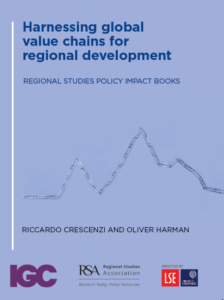We encourage submissions of posts between 800 and 1,200 words written for a non-technical audience. We’re interested in all aspects of globalisation and how it relates to economic development. Although global investment flows are the core focus of this blog we are interested in their intersection with a wide range of issues that include global value chains, offshoring and re-shoring processes, skilled migration as well as city and regional innovation, growth and jobs. We welcome contributions focusing on any country/region or firm from both advanced and emerging economies
We welcome contributors from all fields although writers with expertise in economics, geography, management, innovation studies, political science and sociology are particularly encouraged to submit articles. In terms of content, we aim to publish articles based on rigorous research that are directly relevant to ongoing debates about pressing issues.
You are welcome to propose ideas informally to the editors at geog.gild@lse.ac.uk. To submit an article for consideration, please e-mail it in a Word or .pdf file to us. We will be in touch very shortly.
Style guide
To help authors with the submission process, we’ve compiled a list of some of the main style issues to keep in mind when drafting an article for Global Investments – Local Development.
Length and format
- In order to increase readability and accessibility, we usually aim for articles between 800 and 1,200 words.
- We are also happy to post longer essays of up to 2,000 words if appropriate for the topic. Please discuss this with us.
- ‘Snap’ contributions of around 400 words are also welcome, particularly if they are timely.
- Please send us your draft article in Word or .pdf format, with your name at the top.
Audience, writing style and language
- Your article should be written with a wide audience in mind, including students, policy-makers, businesspeople, and managers.
- Our most widely read blog articles are written in a more natural style, so we recommend that you avoid overusing acronyms and academic terms, such as Latin words, or specific terminology that may not be well known outside disciplinary circles. Also avoid introductory phrases like “In this paper I will…”, or “This paper aims to…”, and go straight into your discussion of the topic.
- Use short paragraphs made up of a few sentences.
- As with journalistic pieces, ‘lead with the best.’ Don’t save your main argument or analysis for the end of the post.
- Write your article as a standalone piece, even if it summarises material in a longer paper or journal article. Try to present all of your argument and evidence within the text and avoid relying too heavily on information contained in external sources. Avoid phrases such as “In my recent paper, I have shown that investments in Latin America have faltered…” and simply say “Investments in Latin America have faltered for the following reasons…” Remember that many journal articles are behind a paywall and not all readers will have access to them. Ultimately the aim is to present your research, not simply to describe what you have written elsewhere.
Referencing
- We use links rather than citations for references. Links should direct readers to more detailed reports or other pieces of research, news items or other blog posts. Open access sources are preferred to those behind paywalls.
- Please insert a hyperlink at the relevant point of your argument that you’d like to reference: e.g. “Joe Bloggs has said…” The easiest way to insert a hyperlink in Microsoft Word is to copy the address of the website, highlight the phrase you’d like to appear as a link in the text and press “ctrl” and “k”. This will bring up an option menu that allows you to paste in the web address.
- Please try to avoid using footnotes wherever possible and integrate material directly into the text.
- If your article draws on a piece of research by yourself or by other researchers, please include the following paragraph at the end of your post: This post is based on the article “[article title]”, by [Author 1] ([Affiliation of Author 1]) and [Author 2] ([Affiliation of Author 2]), published in [Journal name] ([Volume]([Issue]), [Year])
Titles
- We use narrative titles – a single sentence that sums up the main argument of the article. The more descriptive and catchy the title, the more likely the article is to be read. Try to avoid questions (Will the car industry leave Britain after Brexit?) or general topics (“Foreign investments in Britain”). Some examples of good titles:
- Foreign Direct Investments used to flow from developed to growing nations, China and India are now reversing this trend
- The 3 economic mistakes of the Trump administration: why industrial jobs won’t come back
- Cities who want to become hotspots of innovation should not try to attract the biggest tech firms
- Try and keep titles to twenty words or less, if possible
Graphs and charts
- We encourage the use of charts and figures. Graphs and charts are preferable to tables, as they are easier for readers to interpret quickly. In all cases, please send us the raw data of your chart, table, or figure in Excel format.
- Each chart needs a clearly labeled heading, labels for the X and Y axes or histogram bars, including units of measurement and a readable scale or background grid.
- There should be a clear legend distinguishing multiple data series from each other and a brief note on sources. Lines must be thick enough and distinctively coloured. Charts should use a numerical progression to make comparisons more visible
Biography and contributor photo
- We are proud of our contributors, so we like to give them full attribution. Please send us a three to four line biographical note, with your academic position, research interests, and details of your two most recent books or publications.
- Please also send us a small colour photo headshot. Our preference is for a more formal portrait style, rather than a photo taken from an event.
Our editing process
- In most cases submitted articles will be reviewed speedily by the editors, who will edit the piece to ensure it reaches as wide an audience as possible. Once these edits are complete, we will send you the final version of the article, and give you an opportunity to make any corrections.
- All articles on LSE Global Investment Local Development should be evidence based. With this in mind, editors may double-check the factual accuracy of certain points, or ask you for links to supporting information.
Writing style
- Minimise use of bold, underlining, and italics for emphasis.
- We use British spelling – e.g. “organisation” instead of “organization”.
- Use ‘per cent’ instead of %.
Creative Commons and article sharing
- Unless otherwise specified, all of our articles are published under a Creative Commons licence (CC BY-NC-ND 2.0), meaning that other blogs and publications are free to use them as long as they are unmodified and properly attributed. If you do not wish for your article to be republished anywhere else, please let us know.




